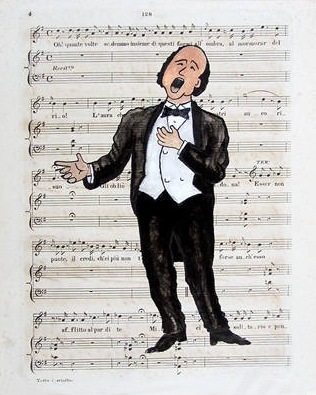[this is a version of a post which first appeared on my blog From the Front of the Choir]
There is a lack of men in many community choirs (Why men won’t sing).

One of the results of this is that the so-called ‘tenor’ section is mainly populated by women, or ‘low ladies’.
This makes several differences to the choir:
For any community choir I make sure that any tenor part doesn’t go much lower than F below middle C, and not much higher than F above middle C.
This sometimes rules out great arrangements that really need a male tenor section.
In fact, as a general rule, this is the overall range I use for a community choir. The tops (who are usually just high altos) don’t go much above F an octave and a half above middle C, and the basses (who are usually baritones) don’t go lower than the F an octave and a half below middle C.
Basically, I assume that the men and women have similar ranges but an octave apart.
Often the tenor part is the sexy, jazzy part, the part with the accidentals or different rhythm. I try to persuade people that the tenor is usually the coolest part of any song (but don’t sing it home alone – see Why tenors shouldn’t sing on their own). In which case it’s really good to hear it punching out through the mix of other voices.
Since women are often at the bottom of the range for the tenor part, they usually don’t have sufficient power in their voices, whereas men singing the same part tend to carry more.
I took over two community choirs which had previously been run by women. The choir had got used to being given the exact pitch for the top, alto and tenor parts. However, since the bass was usually too low, the conductor would give the starting note an octave up and the men would automatically adjust.
It seems to me that men and women make automatic adjustments for the roughly octave difference in their voices (see Singing the same note – differently!). If a woman pitches a note low in her range to a group of men, they assume that they need to sing a note that is also low in their range. They usually make an automatic adjustment and don’t even attempt to match the woman’s pitch exactly.
When I took over, the whole thing switched round: when I sang a note to the women in the choir, they automatically assumed that I wanted them to sing an octave up.
However, when it comes to the tenor part, I can usually sing either at pitch, or an octave down. When the tenor part is mixed women and men, I usually give the note an octave down for the women and at pitch for the men. It only gets confusing occasionally!
the perception of men and women’s singing voices
When a man and a woman are singing exactly the same note, it doesn’t usually feel like it. The man will appear to be singing high in his range, whereas the woman will be singing low in hers.
When a man is singing harmony with a woman he can often be singing a part which is actually pitched lower than the part she is singing, but he perceives it to be higher because he’s singing high in his range whereas she’s singing low in hers.
It takes a bit of getting used to!
My answer is an unqualified ‘yes’. But there is much debate about the issue of Tenor ladies.
Many people deny their very existence, while some people think it damages the female voice. Here are a couple of articles, one written by a woman Tenor: Should women sing Tenor? and the other as part of ChoralNet’s discussion forum: Gendered vocal parts (female tenors).
Whether you believe a woman can truly sing Tenor or not, there is always going to be a difference in vocal quality since a man will be singing high in his range and will sound strong and resonant, whereas a woman will be singing low in her range and will sound dark and husky.
Chris Rowbury: chrisrowbury.com